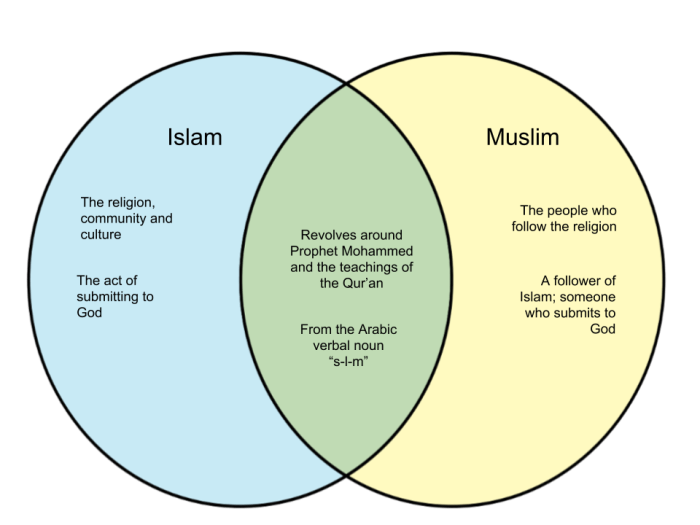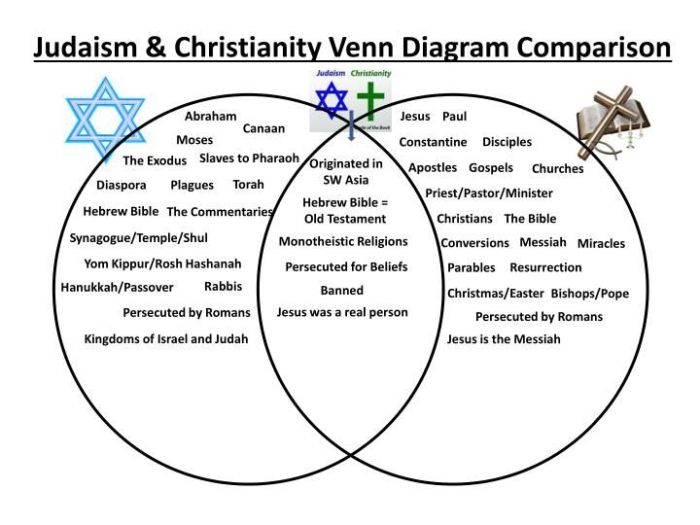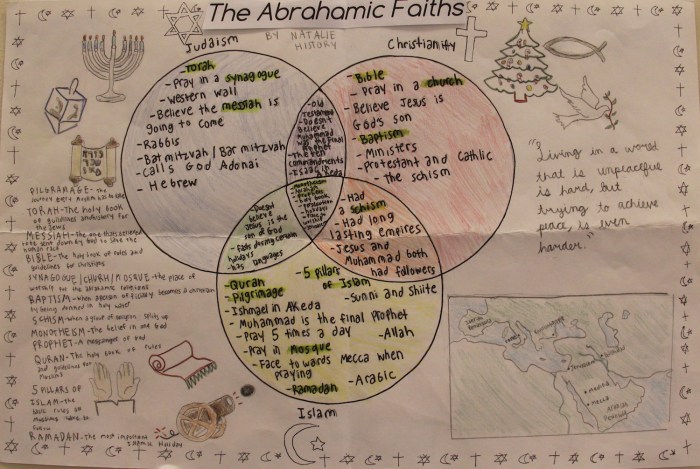The Venn diagram of Christianity and Islam presents a fascinating visual representation of the shared beliefs, practices, and historical connections between these two major world religions. This diagram invites us to explore the areas where they overlap, such as ethical principles and social justice, as well as the key theological differences that set them apart.
By examining the similarities and distinctions between Christianity and Islam, we gain a deeper understanding of the diversity and richness of religious traditions. This comparative analysis provides insights into the historical interactions and contemporary perspectives that shape interfaith dialogue and cooperation.
Commonalities and Overlaps

Christianity and Islam share a number of common beliefs and practices, reflecting their shared Abrahamic heritage. Both religions believe in a monotheistic God, consider Abraham as a patriarch, and recognize the importance of moral conduct and social justice.
Historically and culturally, Christianity and Islam have been closely intertwined. They have influenced each other’s theology, architecture, and literature. The spread of Islam in the Middle East and North Africa brought Christianity into contact with new cultures and ideas.
Key Differences

Theology, Venn diagram of christianity and islam
- Christians believe in the Trinity, the concept that God exists in three persons: the Father, the Son (Jesus Christ), and the Holy Spirit. Muslims believe in the oneness of God (tawhid) and reject the Trinity.
- Christians believe that Jesus Christ is the Son of God and the Savior of humanity. Muslims believe that Jesus was a prophet, but not divine.
Practices
- Christians typically worship on Sundays in churches. Muslims worship five times a day towards Mecca in mosques.
- Christians practice baptism as a sacrament of initiation. Muslims practice circumcision as a sign of the covenant with God.
Holy Texts
- The Bible is the sacred text of Christianity, consisting of the Old and New Testaments. The Quran is the sacred text of Islam, believed to be the direct revelation of God to Muhammad.
Areas of Convergence and Divergence
Social Justice
Both Christianity and Islam emphasize the importance of social justice and charity. They encourage their followers to help the poor, care for the sick, and work for a more just society.
Nature of God
While both religions believe in a monotheistic God, they differ in their understanding of God’s nature. Christianity emphasizes God’s love and mercy, while Islam emphasizes God’s power and sovereignty.
Role of Jesus
Christianity and Islam have fundamentally different views on the role of Jesus. Christians believe that Jesus is the Son of God and the Savior of humanity, while Muslims believe that he was a prophet, but not divine.
Historical Interactions

Periods of Conflict
Christianity and Islam have experienced periods of conflict and violence throughout history, particularly during the Crusades and the Ottoman Empire’s expansion.
Periods of Cooperation
Despite the conflicts, there have also been periods of cooperation and mutual respect between Christians and Muslims. For example, the Abbasid Caliphate in the Middle Ages was a center of learning and cultural exchange between Muslims and Christians.
Contemporary Perspectives

Interfaith Dialogue
In recent decades, there has been a growing emphasis on interfaith dialogue and cooperation between Christians and Muslims. This dialogue has led to a better understanding of each other’s beliefs and practices.
Challenges and Opportunities
Promoting understanding and coexistence between Christians and Muslims remains a challenge, but it is also an opportunity for peace and harmony. Interfaith dialogue, education, and cooperation can help overcome prejudice and foster mutual respect.
User Queries: Venn Diagram Of Christianity And Islam
What is the main difference between Christianity and Islam?
The primary theological difference lies in the nature of God and the role of Jesus. Christianity believes in the Trinity and the divinity of Jesus as the Son of God, while Islam adheres to strict monotheism and considers Jesus as a prophet.
How have Christianity and Islam interacted historically?
Throughout history, there have been periods of both conflict and cooperation between Christianity and Islam. These interactions have influenced the development of both religions and shaped the cultural and political landscapes of various regions.
What are the areas of convergence between Christianity and Islam?
Both religions emphasize social justice, ethical principles, and compassion. They share common values such as charity, forgiveness, and the importance of community.